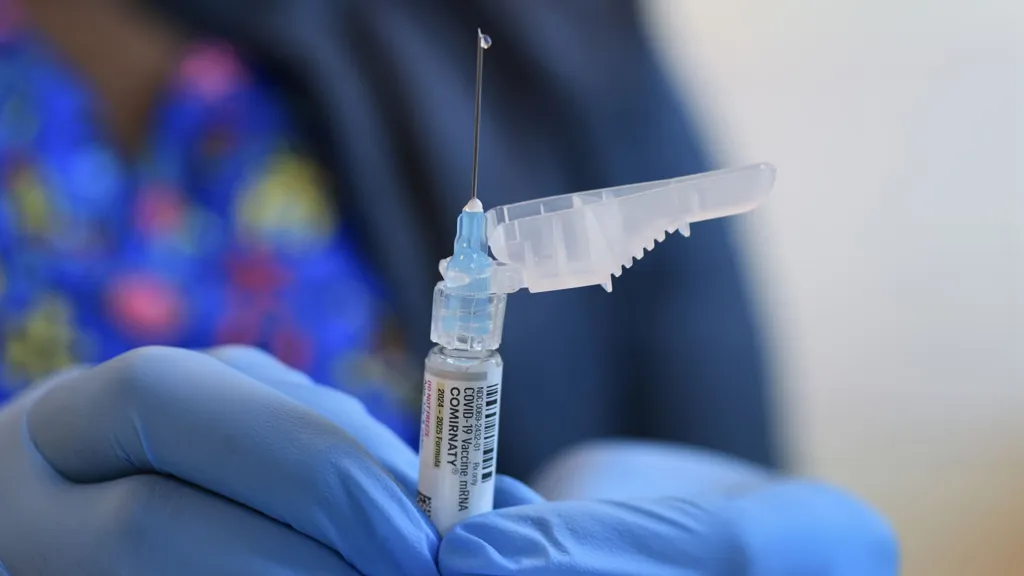Ruth Jones, immunization nurse, holds a Pfizer-BioNTech COVID-19 vaccine (brand name: Comirnaty) at Borinquen Health Care Center in Miami, Florida, on May 29, 2025.
Covid shot access and coverage in the U.S. hang in the balance as an influential government vaccine panel hand-picked by Health and Human Services Secretary Robert F. Kennedy Jr. convenes this week in Atlanta.
The panel, called the Advisory Committee on Immunization Practices, or ACIP, is scheduled to vote on recommendations for Covid jabs and childhood immunizations for hepatitis B and measles, mumps, rubella, and varicella, or MMRV. Kennedy has gutted and restacked that committee with new members, some of whom are vaccine critics, raising concerns that they could soften, delay or fully eliminate recommendations for routine shots proven to be safe and effective.
The panel is expected to vote on the hepatitis B and MMRV shot on Thursday, and Covid vaccines on Friday. The Centers for Disease Control and Prevention, whose latest director was ousted by the Trump administration earlier this month, typically adopts the panel's recommendations.
Some public health experts warn that weakening recommendations for Covid vaccines and other shots could make it harder for some people -- especially healthy adults and children, along with those in rural areas -- to access the jabs and have them covered by insurance.
One major health insurance group on Wednesday said its member plans will cover all vaccines already recommended by ACIP, including updated Covid and flu shots, despite any changes the new slate of appointees makes this week.
Still, any further restrictions on shots by ACIP could have trickle-down effects, further depressing already declining immunization rates for vaccine-preventable diseases and raising the risk of outbreaks.
"There's a pretty good likelihood that the decisions coming out of this meeting will further restrict vaccinations or at a minimum, limit or add confusion to the scope of vaccination coverage at a time when we really need to be doing everything possible to make them as widely available as possible," Neil Maniar, a public health professor at Northeastern University, told CNBC. "There's a lot of concern that we could see unnecessary outbreaks of diseases."
Maniar said the votes are especially critical heading into the fall and winter season when diseases, particularly respiratory viruses like Covid, spread more easily.
The panel's guidance determines which shots insurance plans and some government-run programs must cover at no cost to patients. In some states, pharmacists are also legally barred from administering vaccines that ACIP does not recommend.
If ACIP votes to further restrict shot access, it could normalize policy decisions not grounded in science and further confuse Americans following Kennedy's other recent moves to change U.S. vaccine policy. Those include the CDC's decision to drop Covid shot recommendations for healthy kids and pregnant women, and the Food and Drug Administration's approval of new Covid jabs with limits on who can get them.
The FDA's approval already created confusion leading up to the panel's meeting this week, as some states are requiring that patients have prescriptions to receive a Covid vaccine.
Numerous studies have demonstrated that shots using mRNA technology, including Covid vaccines from Pfizer and Moderna, are safe and effective, and serious side effects have happened in extremely rare cases. One paper in August estimates that Covid vaccines saved more than 2 million lives, mostly among older adults, worldwide between 2020 and October 2024.
"To turn around and claim, well, after five years of all of us getting the vaccines and having them save millions of lives all over the world, the shots are no longer safe and effective - it does lead to confusion and uncertainty," said Dr. Kawsar Talaat, associate professor of international health at the Johns Hopkins Bloomberg School of Public Health.
"People don't know who to trust and who to listen to, and therefore people are less likely to feel comfortable getting the vaccines that could keep them healthy."
